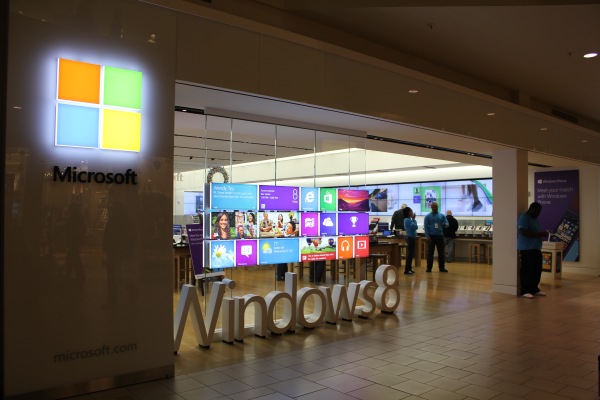 NEWS
NEWS
 NEWS
NEWS
 NEWS
NEWS
![]() Microsoft is said to be planning a single app store for its Windows 8 and Windows Phone operating systems, in one of the strongest signs yet that the two platforms could begin to converge.
Microsoft is said to be planning a single app store for its Windows 8 and Windows Phone operating systems, in one of the strongest signs yet that the two platforms could begin to converge.
A report in The Verge claims that Redmond chiefs want to create a single, unified app store by as soon as spring next year. The plan was revealed by Microsoft’s new operating systems head, Terry Myerson, during a meeting of company chiefs in Redmond yesterday.
The idea is for the new, unified Windows app store to be rolled out at the same time as Windows Phone receives its next update, and a major update to the desktop version of Windows 8, which is scheduled to release some months after the launch of Windows 8.1 this October.
Little is known about this mysterious ‘second’ desktop Windows update, but ZDNet’s Microsoft-watcher Mary Jo Foley believes that it’ll come pre-installed on the first batch of Surface Mini tablets, which are expected to arrive next the year. Internally, the update has been called “Spring 2014 GDR”, with the “GDR” being an acronym for “General Distribution Release,” claims Foley.
As for how Microsoft plans to converge its two app stores, that isn’t immediately clear. One obvious problem that needs to be overcome is the fact that the Windows 8 and Windows Phone apps are entirely different beasts – in fact there are three kinds of apps involved, few of which are compatible with other platforms.
As it is now, the Windows Store offers apps for both Windows 8 and Windows RT devices (those that run on ARM chips), and while many of these will work on the other platform, not all of them do it so well. As for Windows Phone apps, these are different once again. While Microsoft’s mobile OS is built to run on ARM chips, Windows Phone apps don’t actually work with Windows RT devices – developers actually use different APIs to build them, or at least they do at the moment.
One thing that the operating systems do have in common however is the same kernel, and that should make convergence a little easier:
“As we’ve said before, one benefit of Windows Phone 8 sharing a common core with Windows 8 is that developers now have the ability to use much of the same code to deliver apps and games on both Windows 8.1 and Windows Phone 8 devices,” a Microsoft spokesperson told the Seattle Times.
“Beyond that, we have nothing more to share.”
The feeling is that Microsoft absolutely has to do something to make its platforms more attractive to developers anyway. In a recent survey by cross-platform tool company Appcelerator, it was revealed that enterprise developers are rapidly losing interest in the Windows operating system in favor of Android and iOS. The survey revealed that while 80% of enterprise developers are “very interested” in developing apps for iProducts, and 71% said the same for Android devices, just 26% felt the same way about Windows, down from 29% in the previous quarter.
As we saw during this week’s unveiling of the new Surface Pro 2 tablet, the company looks to be increasingly focused on the enterprise as consumers lose interest, and so any sign that its losing ground in this area will be a major worry. Microsoft knows it needs to do something – hence its acquisition of Nokia to beef up its mobility push – and a converged ecosystem would only help to make its platforms more attractive. The move to integrate its app stores suggests that convergence is indeed one of Microsoft’s longer-term goals – most likely we’ll see a merger of the Windows Phone and Windows RT operating systems, and possibly Windows 8 later on. Myerson hinted as much last week during a conference call:
“We should have one silicon interface for all of our devices, we should have one set of APIs on all of our devices, and all of our apps should be available on all of our devices,” Myerson said at the time.
Doing so will take a lot more work than just unifying the two platform’s app stores, but placing them all under one roof is perhaps the obvious first step to take if Microsoft does indeed want to establish a single ecosystem for its products.
Support our mission to keep content open and free by engaging with theCUBE community. Join theCUBE’s Alumni Trust Network, where technology leaders connect, share intelligence and create opportunities.
Founded by tech visionaries John Furrier and Dave Vellante, SiliconANGLE Media has built a dynamic ecosystem of industry-leading digital media brands that reach 15+ million elite tech professionals. Our new proprietary theCUBE AI Video Cloud is breaking ground in audience interaction, leveraging theCUBEai.com neural network to help technology companies make data-driven decisions and stay at the forefront of industry conversations.